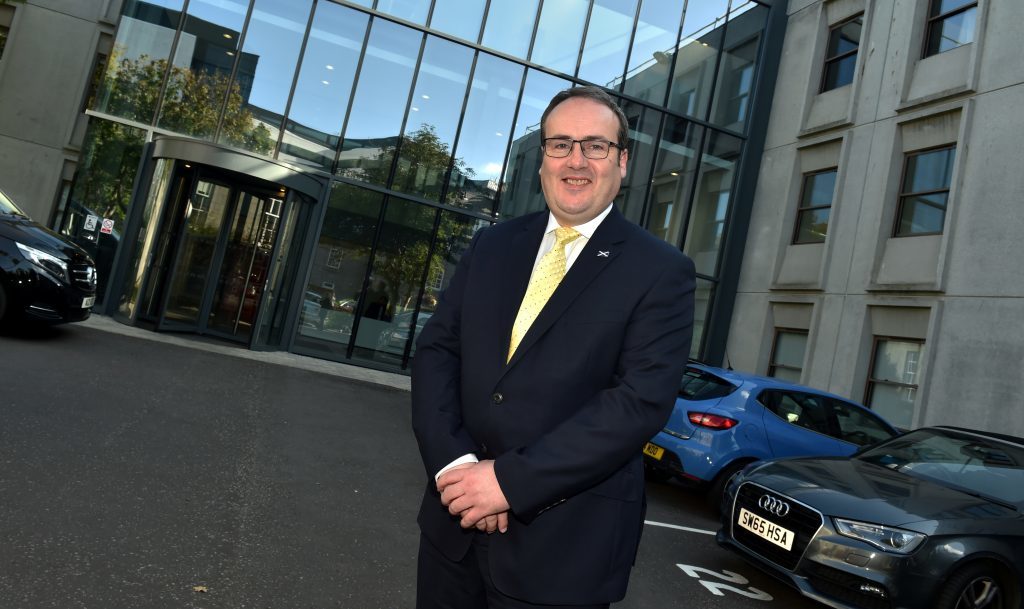
There is no sought after ‘magic’ price tag for a barrel of oil, the Scottish energy minister has said.
Instead Paul Wheelhouse’s believes the struggling industry will survive by adapting to more sustainable lifting costs of getting hydrocarbons out of the North Sea.
The Minister for Business, Innovation and Energy in the Scottish Government was speaking following a meeting of the Maximising Economic Recovery (MER) UK forum in Aberdeen, where officials are seeking to make the most of what the mature basin has remaining to offer.
Professor Alex Kemp, an oil economist based in the Granite City, has previously warned that unless oil prices increase from today’s circa $50 to circa $60 a barrel, less projects will be sanctioned in the North Sea
Asked if the MER UK talks touched on a ‘magic’ number in terms of oil price, Mr Wheelhouse said: “What the industry is trying to do it prepare for an environment where low oil prices might be experienced for longer.
“Rather than obsessing about an individual figure we are focusing on what we can do, sustainably, to reduce the lift cost of oil and to ensure that they have the right industrial relations and business to business collaborations, to make the basin an attractive place to invest when compared to west Africa or South east Asia or the Gulf of Mexico.
“And that is the challenge and we’ve all got to work together – government, industry and the workforce – to put forward the best possible image while also thinking about how we engage with a low carbon agenda and make sure that experience and knowledge in the supply chain benefits from these opportunities.
“It’s really important that we do take heed of the oil price environment but we also do everything we can to reduce unnecessary costs within the system and make the place as attractive as possible.”
Mr Wheelhouse described yesterday’s talks as “really positive” with topics spanning the supply chain, sector collaboration, cultural change and sharing best practice.
He said: “We are seeing progress. Sometimes you do hear concerns in industry. But we are very much focused on the by-words of ‘cautious optimism’.
“There are some good signs like the reduction in number of redundancies, which is very encouraging. But I think everyone is aware of the vulnerability of the sector still and the need to improve the culture within industry to make sure we get the right fiscal and regulatory environment.”
And the MSP stressed that the SNP government was aware of the impact that the downturn in oil prices has had economically across the north-east.
July’s employment figures, while showing record lows of unemplotment across Scotland, showed Aberdeen still 7% higher than the same period last year.
Mr Wheelhouse said: “We’re doing everything we can and we’re very conscious of the impact the downturn in the industry has had on the north-east.
“And it’s true to say there has been more challenging unemployment context in Aberdeen and Aberdeenshire than we have seen for a period of many years after a period of having record low unemployment in the country. That’s a challenge to the local economy.”
He added: “We want to see Aberdeen and the north-east cement itself as a knowledge base for the oil and gas industry globally.
“It’s very important that we are seeing increasing export earnings from the sector, but we could do a lot more.
“We want to showcase Aberdeen, the north-east and indeed Scotland, as a sector known for it’s innovation, it’s technological lead and the knowledge and skills of its highly experienced workforce.”
As for the industry, the energy minister repeated calls for a change to the tax regime for late life assets – something that could be addressed in the Chancellor’s next budget.
He said: “Some of the key levers are not in the Scottish Government’s control and we are encouraging UK ministers to think positively about tax changes that might help the industry, on areas like decommissioning to grow that supply chain and with late life assets and also to help the industry help secure the infrastructure that is there and make sure it is maintained.
“We don’t think enough has been done yet and we would like to see the chancellor take that forward in his next budget.”
To read why UK energy minister Richard Harrington was buoyed by his visit to Aberdeen yesterday click here.
Recommended for you
